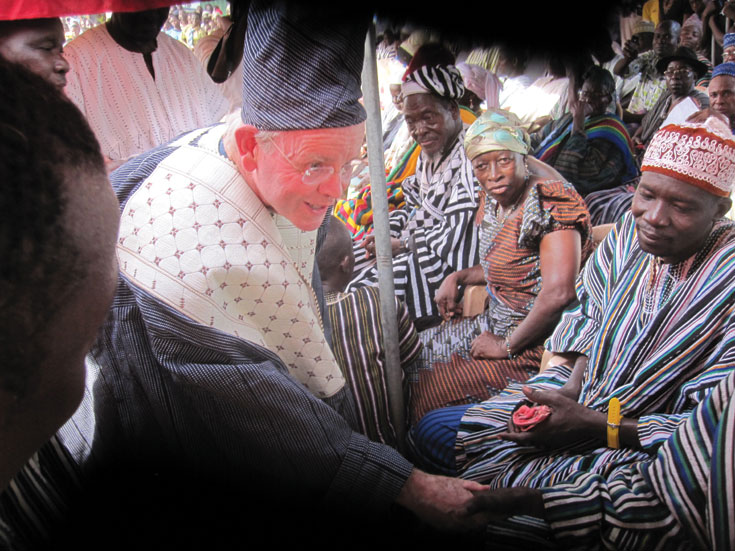| 2015 Q1 | story by KAREN HENRY | photos provided by KU ENDOWMENT |

Stephen Fawcett represented the University of Kansas and signed a memorandum of understanding for cultural, educational and scientific operation with a Ghanaian university, the School of Medicine and Health Sciences at the University for Development Studies (UDS), Tamale campus.
In the midst of the chaos that is the Ebola epidemic in West Africa, a small group of University of Kansas researchers is quietly partnering with their colleagues in the World Health Organization (WHO) African Regional Office. Together, they are developing case studies to help understand what has worked in those areas of Liberia where the spread of Ebola virus disease has waned.
KU’s World Health Organization Collaborating Centre, one of the only such centers focused on community health in North America, will conduct case studies in Liberia in counties where the incidence of the disease has dropped, such as Lofa, and in several other counties where improvement has been slower.
“We will use the case studies to better understand what activities and interventions are associated with reductions in new cases of Ebola, because in a disaster environment, it is very difficult to make sense of what is going on, and to what effect,” said Stephen Fawcett, Kansas Health Foundation Distinguished Professor and the center’s director.
A key tool in developing the case studies is the Online Documentation and Support System (ODSS), a tool originated by the KU Work Group for Community Health and Development, which Fawcett also co-directs. That system will help collect and analyze data from interviews of the staff of governmental organizations (e.g., Ministry of Health, Ebola treatment centers) and non-governmental organizations (e.g., Doctors without Borders) as well as traditional leaders, members of the media and others. The ODSS will make it easier for WHO staff to carry out monitoring and evaluation responsibilities with the Ebola response effort.
At the invitation of WHO, the team started work on the Ebola effort in September, building training routines, developing a field form for use by WHO staff in the regional office and training staff in Brazzaville and Monrovia via Skype. Now the WHO team is beginning to enter data on the Ebola response effort, Fawcett said. Fawcett said that the case studies should be completed by spring 2015.
“The team hopes that the initial case studies in affected areas in Liberia can inform ongoing efforts in that country as well as in Guinea and Sierra Leone, where the Ebola epidemic remains a serious problem,” he said. “Learning from this collaborative project can help guide WHO’s response in continuing and future disease outbreaks.”
Besides Fawcett, the team includes Jerry Schultz, co-director of the KU Work Group, and Florence DiGennaro Reed, assistant professor of applied behavioral science. DiGennaro Reed, a behavioral scientist with expertise in performance improvement, said that the WHO effort was among the most meaningful work of her career. She also co-directs the department’s joint Ph.D.-M.P.H. degree program in collaboration with the Master of Public Health program in the Department of Preventive Medicine and Public Health at KU Medical Center. This is the first degree in the nation to combine an M.P.H. with the advanced study in applied behavioral science. The other two members of the team, Ithar Hassaballa and Charles Sepers, are graduate students in the program and graduate research assistants for the KU Work Group.
“We are really lucky to be able to contribute something that has taken Africa — and the world — by surprise,” said Hassaballa, who has met with community health colleagues and presented at WHO meetings in Botswana and Mauritius in the past few years.
“A lot of people think Kansas is geographically disadvantaged, that the University of Kansas is in the middle of the U.S, and that is hard for us to engage with a global world, but we’ve shown that KU is global and it is doing global work,” she said.
The KU Work Group for Community Health and Development is affiliated with the Life Span Institute and the Department of Applied Behavioral Science. The KU Work Group was first designated as a WHO Collaborating Centre for Community Health and Development in 2004.
